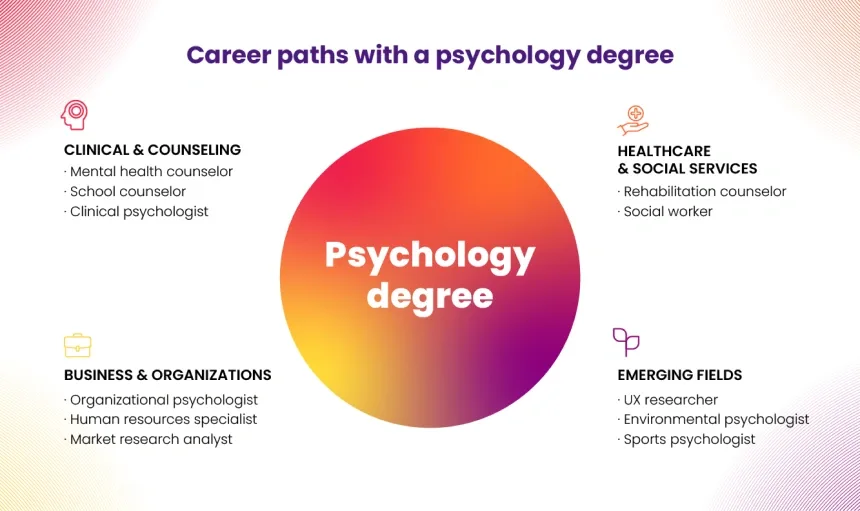What can you do with a psychology degree?
Curious about careers you can pursue with a psychology degree? Discover the options available to you.

What are some career paths for psychology degree holders?
A psychology degree can open doors to a surprisingly diverse range of career paths.
Whether you’re fascinated by human behavior, passionate about helping others, or driven to understand the complexities of the mind, a psychology degree can be your springboard to an impactful career.


Core skills developed in psychology programs
- Critical thinking: Analyze information objectively, identify biases and solve problems effectively
- Research methods: Design and conduct research studies, collect and analyze data, and draw evidence-based conclusions
- Data analysis: Interpret statistical data, identify trends, and communicate findings in a clear and concise manner
- Communication: Communicate effectively both orally and in writing, tailoring your message to diverse audiences
- Interpersonal skills: Build rapport, listen actively, and understand and respond to emotional cues
Career paths in clinical and counseling psychology
For those drawn to direct mental health support, several careers in psychology focus on clinical practice:
- Mental health counselor: Provide therapy to address mental health concerns
- School counselor: Support students’ academic, social and emotional development
- Clinical psychologist: Diagnose and treat mental, emotional, and behavioral disorders
Most roles require a master’s degree or doctorate and a state license.
Psychology in business and organizations
Businesses are recognizing the value of psychological insights, leading to corporate applied psychology degree careers:
- Organizational psychologist: Improve productivity and employee well-being by studying organizational dynamics
- Human resources specialist: Recruit, hire, and train, utilizing psychology principles to optimize HR practices
- Market research analyst: Study consumer behavior, analyze markets and advise companies on marketing strategies
Most roles require a master’s degree, particularly for specialized positions like applied social psychology careers within organizational development.
Psychology in healthcare and social services
The intersection of psychology and healthcare offers diverse careers like:
- Rehabilitation counselor: Assist people with disabilities in adjusting to their conditions and achieving their potential
- Social worker: Provide support and resources to individuals, families, and communities facing challenges
Most roles require a master’s degree, with some roles open to those with a bachelor’s and relevant experience.
Emerging fields and interdisciplinary opportunities
The application of psychology is constantly evolving, creating new career opportunities:
- User experience (UX) researcher: Apply psychological principles to design user-friendly websites, apps and digital products
- Environmental psychologist: Study relationships between humans and their environment, addressing issues like sustainability and urban planning
- Sports psychologist: Help athletes improve their performance by addressing mental and emotional factors
These emerging fields often value interdisciplinary skills, making a psychology degree a strong foundation for further specialization.
Advanced degree options and specializations
For those seeking advanced roles or specialized expertise, a master’s or doctoral degree can open doors. These degrees include:
- Master's in Applied Psychology: Provides training in areas like industrial organization, counseling or forensic psychology
- Doctorate in Psychology (PhD or PsyD): This degree is required for licensure as a clinical psychologist and focuses on research and academic positions. A PhD focuses on research and scientific inquiry, while a PsyD emphasizes clinical practice and patient care.
Additional specializations within psychology include:
- Forensic Psychology
- Neuropsychology
- Child Psychology

Choosing a degree in psychology
A psychology degree isn’t just a stepping stone — it’s a launchpad to a world of possibilities. Whether you’re drawn to direct service, intrigued by human behavior in organizations, or passionate about research and pushing the boundaries of the field, there’s a place for you within the diverse landscape of careers with a psychology degree.
Ready to explore your potential? We can help you discover the program that aligns with your aspirations and guides you toward a potentially rewarding and impactful career. Connect with our enrollment advisors today!